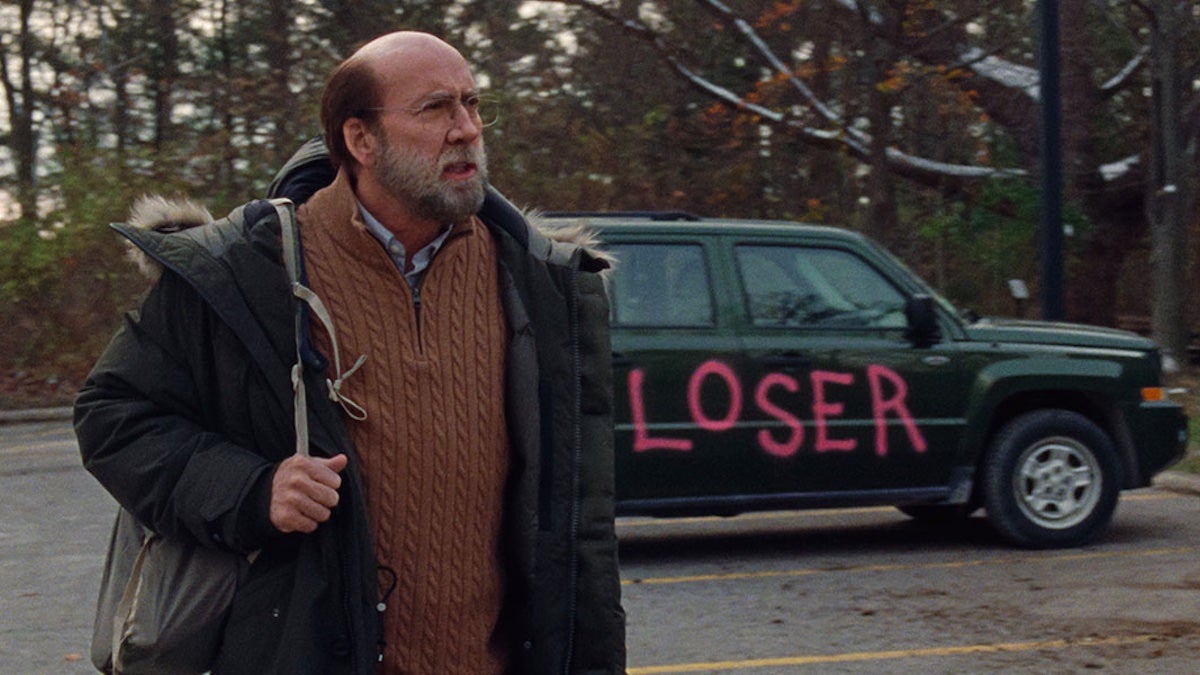
Martin Aubert Tsai
With “Dream Scenario,” Norwegian filmmaker Kristoffer Borgli (“Sick of Myself,” “Drib”) continues his thematic preoccupations with envy, sudden fame, marketing and reversals of fortune. Working in English with an American studio and a Hollywood star onboard, his work readily invites comparisons with the high- concept ethos of Charlie Kaufman.
Nicolas Cage and a few other cast members surprisingly took the stage at the film’s world premiere on Saturday at the Toronto International Film Festival, where actors have been largely absent amid the ongoing SAG-AFTRA strike. The movie’s studio, A24, has signed the interim SAG agreement.
Cage, who memorably portrayed Kaufman (and his fictional twin) in the Kaufman-penned “Adaptation,” similarly deglamorizes himself here to play Paul Matthews, college ethology professor. Though tenured, Paul still craves recognition. His grad school classmate Sheila (Paula Boudreau) is about to publish a paper based on an idea he shared three decades ago, and deny him credit for it.
While on a night out with his wife, Janet (Julianne Nicholson), Paul bumps into old flame Claire (Marnie McPhail Diamond), who has been seeing him in her dreams. After she blogs about it with his permission, Paul is inundated with messages from random strangers who all claim to have dreamt about him. A vast majority of his students also report the same. There’s of course no scientific explanation for this phenomenon. Paul somewhat revels in the attention, hoping to leverage it into a publishing deal for a book he’s yet to commence.
Recalling Borgli’s debut feature, “Drib,” a branding agency led by Trent (Michael Cera) is eager to monetize this with endorsement deals and movie rights to Paul’s life story, while Paul himself still single-mindedly pitches for his as-yet-unwritten book. Eventually, another company harnesses his unique ability and launches a wristband that allows the wearer to appear in others’ dreams. Borgli introduces the product with a faux infomercial, which especially brings Kaufman to mind. This tangent is mildly amusing, though it doesn’t offer any substantive commentary on the absurdity of it all.
Molly (Dylan Gelula), who works at the branding agency, also has dreams about Paul, hers of a sexual nature. After flirting tentatively, she lures him back to her apartment and proceeds to direct him to reenact her dreams. Naturally, the real deal falls far short of the man of her dreams. This particular scene is perhaps the film’s most original and funniest.
Of course, some of the dreams are in fact nightmares. During the dream sequences, Borgli effectively dials into various horror tropes to great comedic effect. Moviegoers reliably chuckle every time they recognize one of these horror genre exercises within the comedic context.
Initially, Paul appears in people’s dreams as a passive bystander, but in time he becomes physically violent in them. Students stop showing up to his class as they deem the mere sight of him triggering. He also finds himself unwelcome anywhere in public, because others are uncomfortable in his presence. The college eventually commissions a cognitive behavioral psychologist to conduct exposure therapy for Paul’s entire class. Unlike some of the mumbo jumbo in the film, Borgli did not invent this. Fortunately, he doesn’t denigrate this science.
“Dream Scenario” does, however, appear at times to be making a strawman argument against cancel culture. Paul hasn’t done anything to anyone in reality, but people nevertheless hold him accountable for his actions in their dreams. He has to cancel his classes for the rest of the semester and meet with HR, despite the fact that he’s the one who’s being victimized and who’s had his car tagged on campus. He will ultimately be kicked out of his own home and relegated to sleeping on a cot next to a propane tank in his colleague Brett’s (Tim Meadows) basement.
It’s of course fine to scrutinize and lampoon hive-mind mentality and ostracization, but the film specifically namedrops “cancel culture” here. It’s a buzzy catchphrase for sure, but this unwitting conflation comes off as dismissive of the notion that society as a whole should reject proven monsters.
Cage, who shares a producing credit here, definitely knows how to attach himself to some of the most inspired and destined-for-cult-status projects. “Dream Scenario” is another one that cements his legend with movie buffs. As Paul, his performance is noticeably dialed down so that snippets of dream sequences of him going fully lunatic prove much more hilarious.
Although its internal logic and messaging are at times muddled and not fully formed, “Dream Scenario” still proves immensely entertaining. It’s always exciting to see a film when you have not the slightest clue where it is going to go. With this movie, Borgli firmly establishes himself as an exciting talent to watch.
“Dream Scenario” will be released by A24 in November.
















